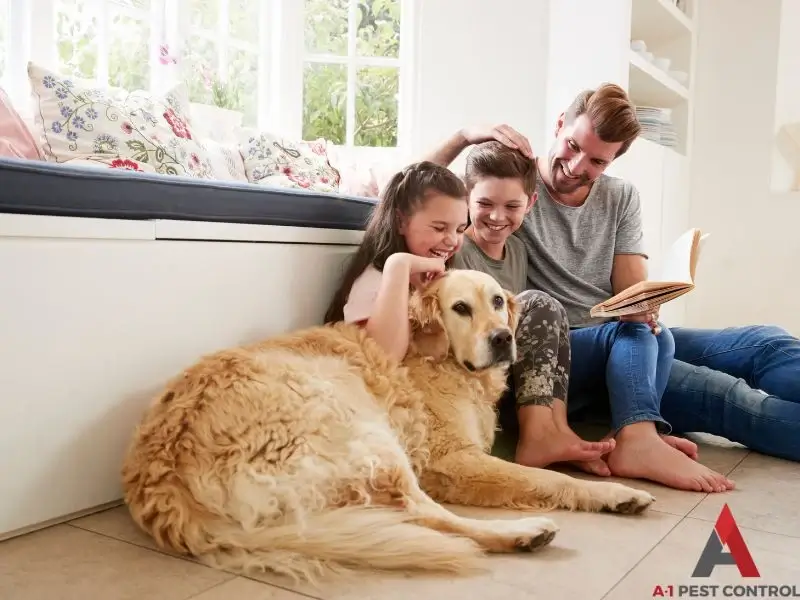
Pet-Friendly Pest Control Solutions for Homeowners
For homeowners in North Carolina, keeping pests at bay is a constant challenge, especially when pets are involved. Conventional pest control methods often mean harsh chemicals that can be harmful to our four-legged friends, leading to serious health concerns such as respiratory issues, skin irritation, or even poisoning. Thankfully, though—there are plenty of alternatives that effectively target pests while ensuring the safety of your pets.
In this guide, our pest control technicians will explore the top five pet-friendly pest control solutions, from choosing the right products to creating a comprehensive pest control plan.
Table of Contents
Understanding Pet-Friendly Pest Control
Pet-friendly pest control focuses on methods and products that eliminate pests without posing risks to your pets. While traditional pesticides may be effective, they often contain toxic chemicals that can harm animals, especially curious pets that sniff, lick, or walk on treated surfaces.
Pet-friendly options emphasize natural, non-toxic ingredients and environmentally safe practices. These solutions protect not only your pets but also the local ecosystem, reducing harmful chemical exposure in your home. Understanding the difference between conventional and pet-friendly pest control is the first step in making informed choices for your household.

How to Find Pet-Safe Pest Control Products
When selecting pest control products, always prioritize safety by looking for those specifically designed with pets in mind. Many natural and non-toxic solutions can effectively manage pests without compromising your pet’s health. Products with certifications from reputable organizations, such as the Environmental Protection Agency (EPA), are excellent choices.
Always read labels and ingredient lists to ensure that a product is truly pet-safe. Terms like “organic” or “natural” don’t always guarantee safety, so research thoroughly before making a purchase.
The 5 Best Pet-Friendly Pest Control Solutions
Keeping your home pest-free doesn’t have to come at the expense of your pet’s safety. In fact, there are plenty of incredibly effective pest control solutions that won’t cramp their style.
Diatomaceous Earth
Diatomaceous earth is a versatile and highly effective pest control solution. Made from fossilized algae, this fine powder works by dehydrating pests, ultimately eliminating them. It is safe to use around pets when applied correctly and can be sprinkled in areas prone to pest activity, such as baseboards, cracks, and garden beds. Be sure to use food-grade diatomaceous earth, as other types may not be safe for household use.
Sticky Fly Paper
Sometimes the simplest answer is the best one. For instance, fly paper—an old standby— is an extremely effective way to control flies and other flying insects. Products can be non-toxic and adhesive, trapping pests without releasing harmful chemicals into the air.
Place fly paper in areas where flies are most active, such as near trash bins or outdoor seating areas, but keep them out of your pet’s reach to avoid accidental contact.
Citrus-Based Sprays
A citrus-based spray that targets ants, roaches, and other household pests is another pet friendly pest control solution. The active ingredient, d-limonene, is derived from orange peels and is safe for pets when used as directed.
This product can be applied directly to problem areas, creating an effective barrier against pests. An added bonus? It has a pleasant citrus scent.
Pet-Safe Pest Control Plants
Certain plants naturally repel pests while being harmless to pets. For instance, golden marigolds (be careful of other varieties!) deter mosquitoes and aphids, while rosemary keeps fleas at bay.
Incorporating these plants into your garden or indoor décor not only helps with pest control but also enhances the aesthetics of your home. Always research plant toxicity before introducing new greenery, as some plants can be harmful to pets.
Ultrasonic Repellents
Ultrasonic pest repellents emit high-frequency sounds that drive away pests like rodents and insects. These devices are inaudible to humans and most pets, making them a safe and low-maintenance option. Ultrasonic repellents are especially useful in spaces like basements, attics, and garages, where pests often hide.
Using Pet-Safe Pest Control Products Effectively
Even pet-safe pest control products must be used correctly to minimize risks. Always follow the manufacturer’s instructions and take precautions such as keeping pets away from treated areas until the product has dried or settled. If you’re using sprays, powders, or traps, monitor your pets to ensure they don’t come into contact with these items.
After applying pest control products, observe your pets for any signs of discomfort, such as excessive scratching, coughing, or lethargy. If you notice unusual behavior, consult your veterinarian immediately.
Creating an Effective Pet-Friendly Pest Control Plan
An effective pest control strategy is one that balances safety and efficiency.
Identify the Pest
Determine the type of pest you’re dealing with, as different pests require tailored approaches. For example, fleas might necessitate using diatomaceous earth, while ants could be better controlled with a citrus-based spray.
Use Multiple Methods
Combining various control methods often produces the best results. Tools like sticky traps, natural repellents, and proper sanitation work together to prevent infestations and protect your home.
Consult a Professional
A pest control specialist, like those at A-1 Pest Control, can evaluate your situation and recommend the most effective solutions. Professionals can curate a customized plan using advanced tools and techniques to address specific pests safely and efficiently.
FAQ: Pet-Friendly Pest Control
How do I know if a pest control product is safe for pets?
Look for clear labeling that specifies pet safety, as well as active ingredients that are non-toxic to animals. Check for certifications such as the EPA’s Safer Choice label or endorsements from reputable pet health organizations. Online reviews and recommendations from trusted sources can also provide valuable insights.
What should I do if my pet is exposed to a pest control product?
If you suspect your pet has come into contact with a pest control product, monitor their behavior for any signs of discomfort, illness, or unusual activity. Contact your veterinarian immediately for guidance and bring the product label for reference. Early intervention can prevent more serious health issues.
Are natural pest control products effective against common household pests?
Natural pest control products can be highly effective when used as part of a comprehensive pest management strategy. Options like diatomaceous earth, citrus-based sprays, and essential oil repellents work well for many pests. However, their success often depends on proper application and integration with preventive measures such as sanitation and maintenance.
Contact A-1 for Pet-Friendly Pest Control in North Carolina
If you’re unsure which products or methods are best for your home, the experts at A-1 Pest Control are here to help. With years of experience serving North Carolina homeowners, we provide customized, pet-safe pest control plans that target your pest problems effectively and safely. Contact us today at 828-481-9140 or fill out the form to learn more and schedule your consultation!
